We’ve been to FOSDEM in Belgium this year. A couple of Many of Redpill’s Agents (so called: Consultants) have made the trip to Belgium to join the annual conference taking place at Université libre de Bruxelles (ULB).
This year the conference was held during the first weekend in February, at the 1st and 2nd.
For those who don’t know: FOSDEM is a free software developer conference where you can attend talks about various different tools, processes and ideas and meet people behind some of the most used applications and tools out there.
The conference is carried by volunteers and many people offering their man-power to make this event happen. Therefore the attendance is free, no registration required.
But you encouraged to support the event by buying some of the merchandise like t-shirts, hoodies or other stuff if you like. Good if you do, fine if you don’t.
Talks
The following list contains talks I’ve attended personally and the opinion is my own. Other attendees might have made other experiences and formed different opinions (and joined other talks as well).
Using OpenAPI to Maximise your Pulp 3 Experience
With Pulp 3 just arrived (and my first couple of installations behind me), I looked forward to get a bit more insight into it. Unfortunately this talk was more about hooking into the OpenAPI that is used in Pulp 3, than what I was hoping for.
Nonetheless it gave me a good starting point and a better understanding of what is going on under the hood of Pulp nowadays.
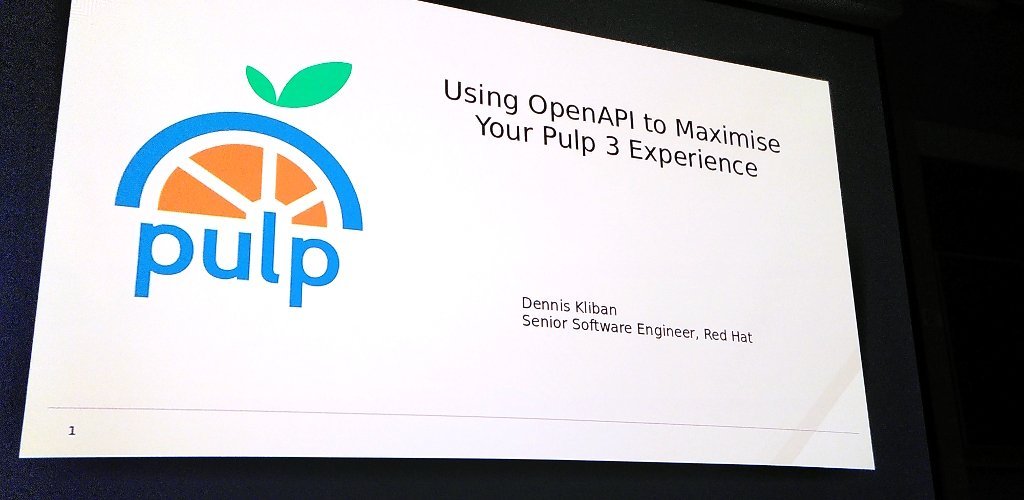
The Ethics Behind Your IoT
Sat. 12:00, Speaker: Molly de Blanc
This talk promised to give an introduction into the ethics that might be worth to consider when introduction IoT devices and what implications this kind of technology can have on us and it’s surroundings.
The speaker seemed quite used to be on stage, which gave a good first impression.
However, several side-tracks which in my opinion either didn’t have anything to do with the topic at hand or were of no-use to me made me leave this talk after the first half an hour in search for something more meaningful.
It might have been the case that the topics mentioned in the summary were covered after I left, but in my opinion the content about the talk on the web-page did not reflect the content on the stage.
Introduction to Ansible collections
Sat. 12:30, Abhijeet Kasurde, Ganesh Nalawade
This talk was a short term replacement for a previous talk. I was only able to catch it because I had a continuous eye on the FOSDEM app, which accompanied the event. Short-term announcements where made there and the app also warned about upcoming talks I was interested in.
Ansible collection is a relatively new thing and allows to abstract and package the playbooks, module and plugins into packages as well. If you want to put them on Ansible galaxy or a private repository is your choice, though.
This will actually help me on a customer project I am working on at the moment. So it was good to get a quick introduction and that I was able to ask the speakers one or two questions afterwards as well.
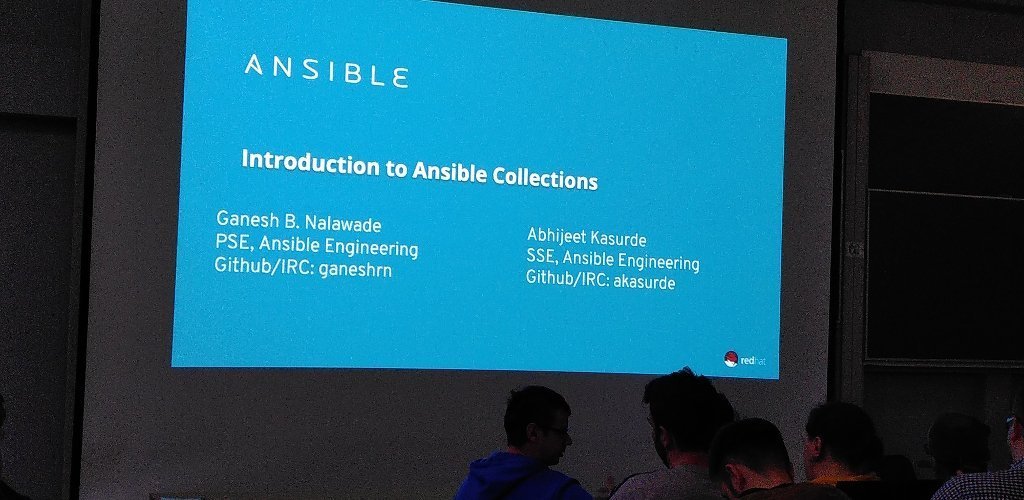
Designing for Failure
The second amendment and short term replacement.
This talk shed some light on the importance of designing a system with failures in mind. It’s inevitable that a system will fail, so you have to keep this already in mind when you design it.
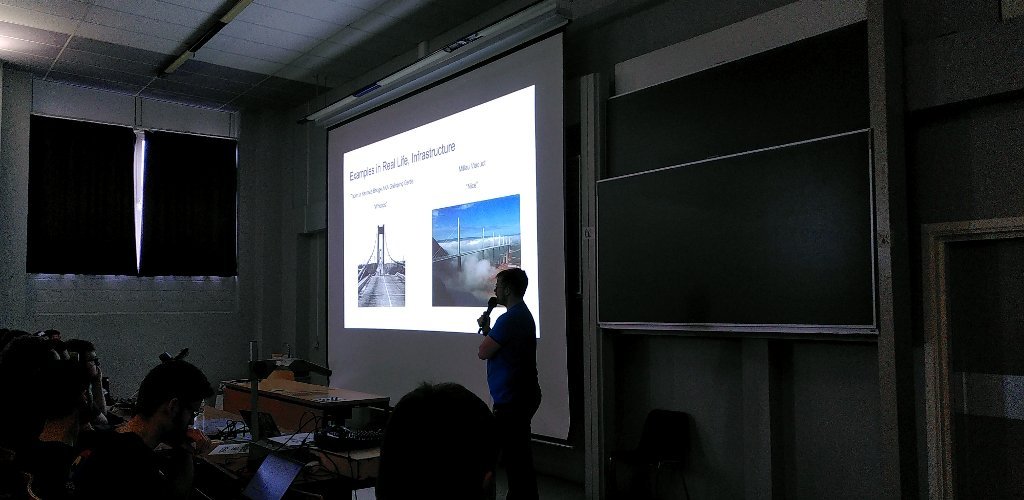
The Hidden early History of Unix
Ever heard of the PDP? PDP 9 or something before that? No? Me neither.
Less technical but still very accurate, Warner went through the earlier history parts of Linux and Unix and focused on the development of the DPP - back then when the numbers of computers where still in the single digit realm.
It was not know to me how little fragments are left of that time and area. That much of the programming code is lost, though the hardware still might exist. Like in case with the PDP. Sometimes the only fragments left are a single screenshot of a game. And occasionally more material is discovered in the belongings of those who where involved during these days. After they have passed. On paper.
We should just call it luck that some information is retrieved at all and even more so, that there are people working on this, trying to preserve the history on that meticulous level.
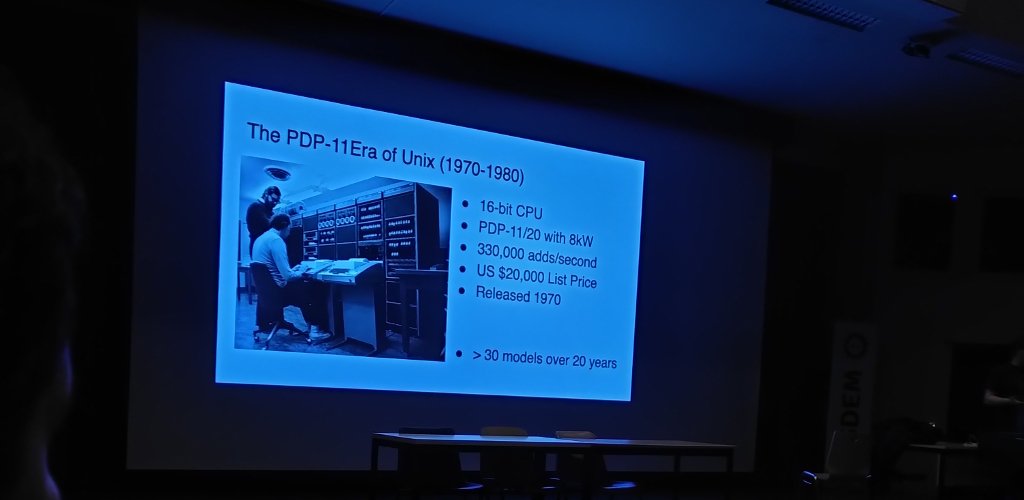
Plain-text secrets
Curiosity drove me to this talk. How where they planning to hide secrets in plain, simple text files?
Funny enough the project dealing with this is called Oslo.config, considering where i work.
To make it short: They are replacing the secrets with an ID, which than can be resolved into the correct value by an application running in the background at run-time. Maybe not the optimal solution for simpler setups, but when put into the context of projects like OpenStack, where a lot of services interacting with each other, this actually might solve a problem there.
The demo worked (what else can you hope for) and looked stable. We’ll see where this leads us.
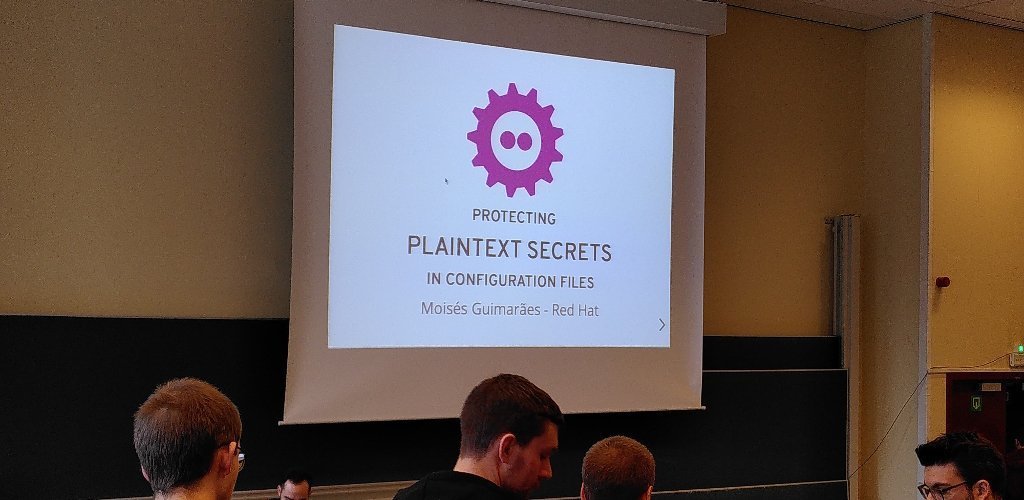
The core values of Software Freedom
Sun. 11:00, Matthias Kirschner
A less technical and more meta talk arguing that limiting the software freedom leads down a spiral of new problems. Problems and limitations that you not only want to deal with, but rather will turn out to be a disadvantage at some point, that you haven’t considered in the beginning.
The usage of software licenses to propagate your values into other fields and problems and try to solve those as well, does usually not end well. As tempting it might be, to e.g. exclude military usage of your tool, this will also exclude any humanitarian tasks executed by the military. Compensating for this will get any license more and more complex. At end you’re left unable to answer the simple question: Can I use your tool?
The suggestion here is that software licensing might not be the right tool to address problems outside of the development realm.
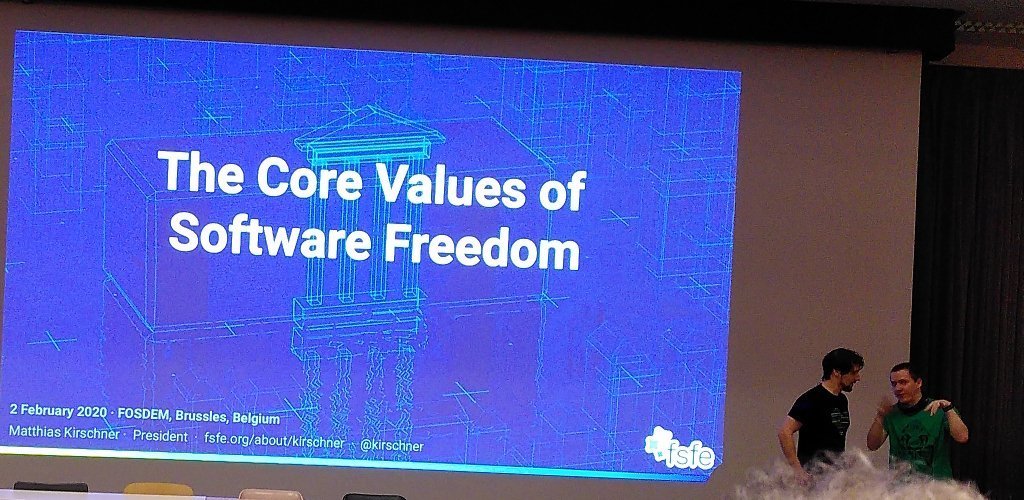
Monitoring strawberries
Sun 11:50, Jean-Marc Davril This was one of the pearls in term of entertaining talks on the FOSDEM. The quintessence is the following: The project Agricool (Link is dead now) is distributing containers in Paris and Dubai and growing strawberries (and other stuff) inside them. The basic idea is to cut down the travel distance from Spain (or from wherever), avoid strawberries that have been harvested to early and automate and monitor as much as possible.
The outcome are small islands/container of strawberries which grow inside of the cities, are more tasteful than the imports and produce more berry per sqm used.
This talk also dealt with the problems the group encountered and still is trying to solve.
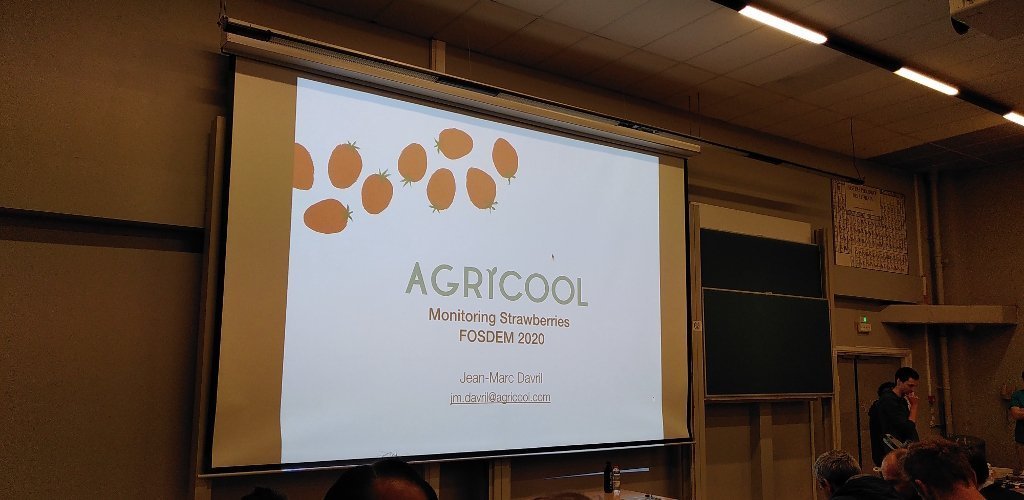
Why GPL is great for business
This talk took place in one of the bigger audiences. Frank is the founder of Owncloud and Nextcloud, so naturally the talk mentioned this and occasionally threw in a some marketing comments or two. It shall be forgiven.
However, the talking speed was a bit slow to accommodate for all in the audience and just a quarter to the end I left, knowing I could catch up with it using the video recording available on the FOSDEM web-page.
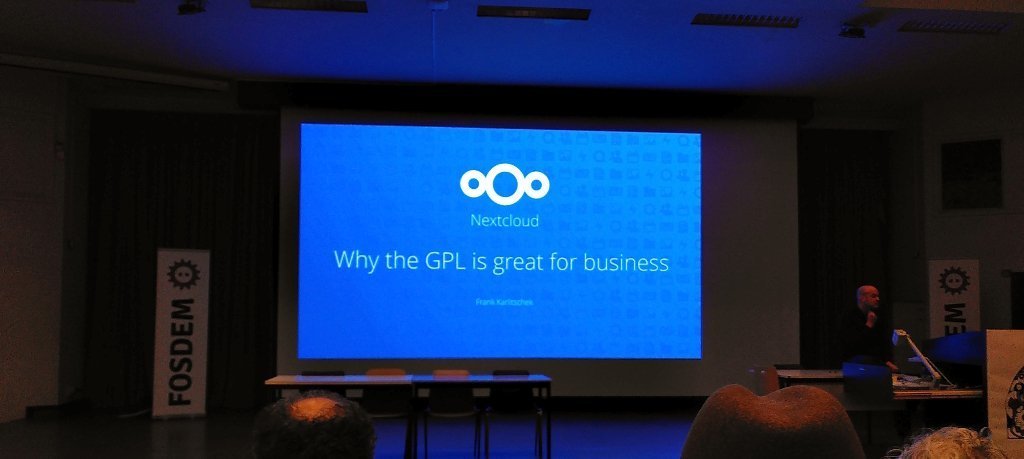
How to measure Linux Performance Wrong
Another quick and useful talk that showed the current problems with measuring Linux performance and made some suggestions of how to make it better. It was nice to listen to some one who seemed to know some more of the insights of what was going on, could explain it, present it and lead you through the long journey of possible useless monitoring and measuring.
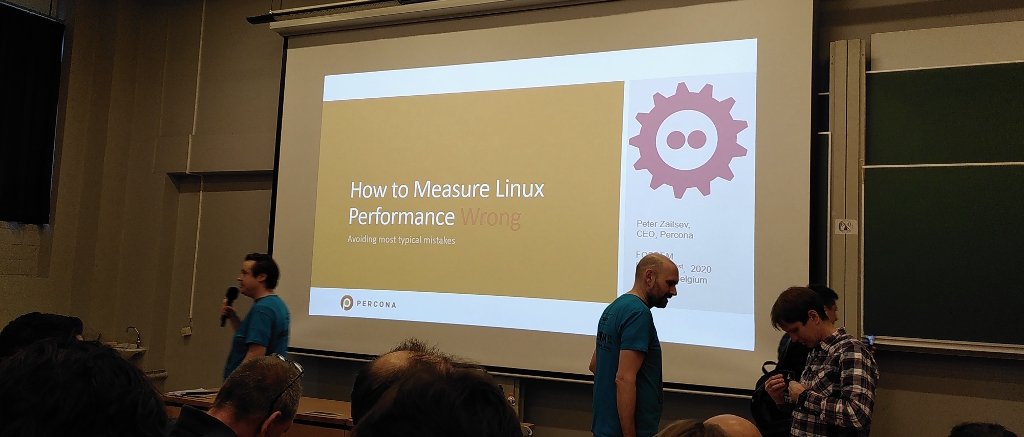
Venue
People
The FOSDEM conference is free of charge. No registration required. Therefore it’s not surprising that you see all kind of people there, basically everybody who’s able to afford the travel costs, I’d say. This guarantees a wide range of interests and topics to discuss, probably more that on any other conference where you would have to pay your entrance fee.
This is one of the strongest sides of FOSDEM conference, I’d say.
You could hear people talking and discussing all kind of topics at every possible location: the halls between the rooms, the cafeterias, on the way from one building to the other.
On the other hand that made it a bit harder to find the right people to talk to. Some of the topics were far outside my expertise, so you had to keep on your toes to go after the right people or to catch the speakers in the right moment if you wanted to engage them.
Overall, the conference mood was very relaxed and quit. Everybody seemed to enjoy the conference very much and it seemed to went very smoothly.
Food and drinks
For the hunger and thirst of the conference attendees, the organizers had placed a couple of food trucks in the center of the university. You could choose from a variety of typical Belgian fries, hamburger, sausages and other grilled, cooked or otherwise prepared choices of food.
To support this, the cafeterias of the university had also been taken in use and served coffee and stuff. Sodas and Mate were also present. Small water bottle were sold for one Euro in addition. So neither the prices nor the quality of the food were terrifying.
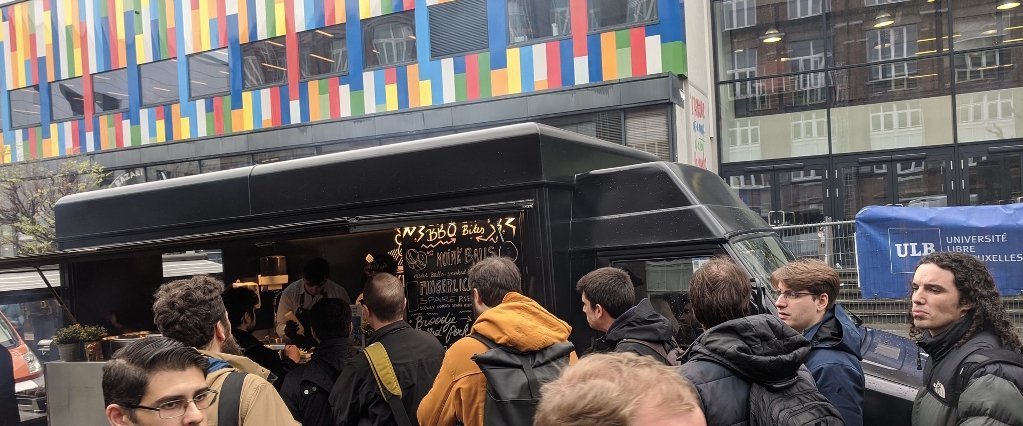
Transport and transport
The university lies about half an hour off the city center of Brussels. While any cap will probably be easily be able to transport you there, we’ve chosen the public transport system (namely: bus) to get us to the conference. That was easy, uncomplicated and took only half an hour to get there.
The rest of the time we got around by foot. The typical tourist center were quickly covered by foot. After a day following lectures about all kind of topics, the big travel plans had to wait and make place for some leisure time.
TL;DR
The number of talks and people is overwhelming. Study the schedule ahead and make a plan of where to be and what to do. Socialize and network. Talk to people. The quality of the presentations might be lower than on other conferences, but so is the ticket fee. You won’t get that kind of diversity and broad coverage of topics on any other conference.

